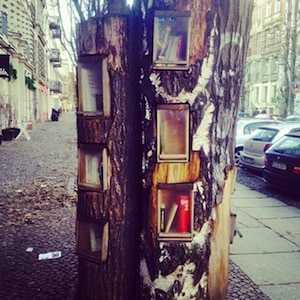Around the world, there is a dedicated community of book-lovers who use technology to celebrate the printed book. Known as BookCrossers, they aim to connect people through books by sending literature into the world for anyone to stumble upon and enjoy.

MAARIA ADAMOU/INSTAGRAM
To participate, you register a book online at www.bookcrossing.com where it gets a code that you write inside the book, along with a link to the website. You then release the book anywhere you choose — whether on a park bench, in a tree, or in a coffee shop. When someone finds it, ideally, they log in to the website and register its current location. Once they read the book, they then leave it elsewhere for the next BookCrosser to find. Users can keep track of their book and its travels, with some books logging thousands of catches and releases all around the world.
The Varsity interviewed two avid Torontonian BookCrossers, Lauren Rossow and Christina Laurence, usernames hoserlauren and pink-oeria.
The Varsity: Why did you get involved with BookCrossing and what has made you fall in love with it?
Lauren Rossow: I have always been a big reader but never really knew what to do with my books after I finished reading them because there are too many books in the world to go back and re-read any of them. BookCrossing was perfect for me. You never know where your book will wind up or the lives they will touch. I also love the BookCrossing community. There are many BookCrossers in the GTA, and every so often, we meet up for lunch and talk.
TV: Can you explain a little about RABCK (Random Acts of BookCrossing Kindness), and any other BookCrossing offshoots that make this experience even more personal and enjoyable?
Christina Laurence: RABCKs… can be a number of things. There are people that offer up books or related goodies in a draw, and sweeps where people send a book to the winner — for example, there are the ‘Thriller and Tea’ and the ‘Chick-lit and Chocolate’ ones. BookCrossers are incredibly generous and it really enhances the BookCrossing experience in my opinion. There are also Release Challenges where people are challenged to do certain releases. In November, I always host the ‘E-less’ challenge, which challenges people to release books without an ‘E’ in the title. There are also games to do themed releases, like the Monopoly game where the teams would work out among themselves how to release the books related to their theme. Points were awarded for originality of execution. Additionally, each year, one country organizes the official BookCrossing Convention. BookCrossers from all over the world come together to celebrate their love of reading and sharing books.
TV: Can you give an anecdote of one of the most memorable moments you have had with BookCrossing?
LR: One of my most memorable BookCrossing catches was a book that I released while on vacation at Lake Louise, Alberta. The book was dropped off on a ledge by the lake. A few months later, a journal entry had been made that the book was picked up in Scotland. Obviously, it changed hands in between Alberta and Scotland. It’s just amazing how far your books can travel!
TV: Where are the best places in Toronto to go hunting for books?
LR: The Official BookCrossing Zone (OBCZ) at Harbord House Pub is a great place to start your hunt! The underground PATH has been a favourite of mine for wild releasing recently, and [I] have had luck finding books at the Starbucks at Yonge and Bloor. The BookCrossing website allows you to “go hunting” for books, to find where books have recently been wild released.
TV: Do you use e-readers or any other electronic devices to read on? Why, or why not?
CL: Yes, I use an e-reader. For several reasons: I am running out of space for my books in my house, so anything I want to keep I tend to buy for my e-reader. I also find it easier to buy books that way… And I also travel a lot, so it’s more convenient to pack my Kindle with hundreds of books on it rather than a suitcase full of books. I still really enjoy reading “real” books, and I love the feel of them, so I don’t think the e-reader will replace my regular books.
TV: With the growing use of e-readers and online books, do you think there is a danger of print books becoming obsolete?
LR: While I do believe that the use of e-readers will become more prevalent, I don’t think we’ll ever see a time where printed books no longer exist. Printed books hold memories. When you picked up a used book, you wonder where it came from. You look for the notes on the pages and the dog-ears. The only difference e-books make for me in terms of BookCrossing is that I am now asked whether I want a paper copy or electronic copy of the book when I swap or trade.
CL: I would certainly hope not. I still love real books, and I think it is much nicer to give a printed book as a gift rather than an e-book. And you can’t sell e-books second hand either. I don’t think printed books will become obsolete anytime soon.
This interview has been edited for length and clarity.

